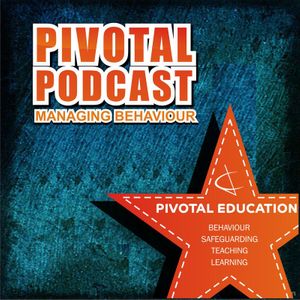Mark Finnis on How to Implement Restorative Practice for Great Results! PP107
Pivotal Podcast - A podcast by Pivotal Education

Categories:
Mark Finnis joined us this week to talk about Restorative Practice. Mark was originally a Youth Worker in Liverpool where he did some work with the Youth Offending team and discovered the concepts of restorative justice. He has been working with Primary Schools, Secondary Schools, Special Schools and Pupil Referral Units since 2001, helping them to develop a restorative culture. Why do you think punishment doesn’t work? For me, punishment just creates resentment rather than reflection. Inappropriate behaviour should be seen as an opportunity for learning but a lot of the time, according to Mark, we just base things on tradition – ‘just because we have always done it that way’ doesn’t mean it isn’t incredibly stupid. A lot of the children Mark works with just factor detention into their day – so instead of finishing at 3.30pm they finish at 4.00pm. What’s wrong with children just being made to say they are sorry? Children can be quick to say this but for them it’s just a statement. Then they go on to, “I promise I won’t do it again.” In restorative practice, it’s all about ‘how do I make it up to you?’ ‘What needs to be different next time?’ ‘What needs to come out of this meeting for things to be different?’ Saying you are sorry doesn’t deal with the causes of the relationship breakdown or solve what’s going on underneath. Relationships are at the core of restorative practice In restorative practice, relationships, responsibility and accountability are at the heart of the approach. It’s about working with people not doing things to them or for them. There should be challenge and support as two ‘axes’. In a restorative approach you still set boundaries, expectations and consequences but it’s done in a continuum of support. The adults create the culture in a school. It’s important to be really explicit about what the values are that drive the school, what the skills are that you need and what they look like in practice. initially, Mark talks more about relationships when he works with schools and less about restorative practice. He focusses on what the school does to build relationships and maintain them and what they do when things go wrong and they need to repair them. Mark is also sure that children and their families also need to be involved. Young people aren’t passengers – they are part of the crew. Schools need to work on how to create a collaborative culture where it’s seen as everyone’s responsibility to manage behaviour – not just adults’. Mark points out this is a big shift for some schools and it’s also challenging to get young people to see themselves as being part of the process. If it’s always the adults who sort out behaviour then we are creating dependency rather then independence – we disable rather than enable. The adult’s role in a restorative meeting Mark works with adults to train them to facilitate low-level conversations up to more formal processes like a reintegration from exclusion. Mark doesn’t use scripts in his restorative model with adults but he is keen to give adults the skills they need to facilitate young people’s reflection on their behaviour, understand their unique perspective and the impact on each other and how help them start to move things forward. What do schools need to have in place before they can move to a restorative approach? Mark feels that there are lots of schools who don’t realise they are doing restorative things already. For example, in a lot of schools relationships are important… Mark on Twitter